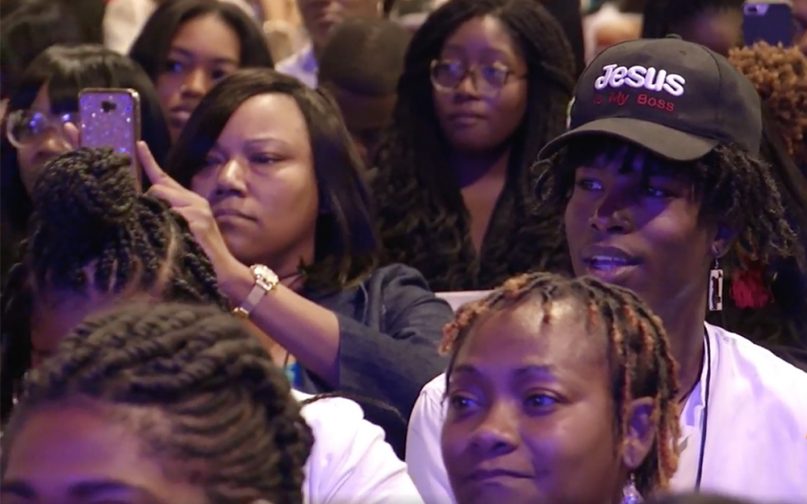(RNS) — It’s no secret that the Democratic Party cannot win national elections without the black vote. Less well understood by major Democratic candidates and donors is that black voters are not a monolith. Particularly in the black church, we fall along a wide spectrum of conservative and liberal social values. Our intersections related to race and gender are complex and nuanced.
When black people say that they are tired of our votes being taken for granted, we are referring in part to this lack of understanding. Gaining our vote requires gaining more than a cursory understanding of who we are as a people. Candidates will need to be able to speak to a full range of issues and concerns and, just as importantly, feel comfortable engaging directly with a range of African American people.
Three years ago, the Black Church PAC was formed to give our historically critical voting demographic a greater voice before we go to the polls. On Friday and Saturday (Aug. 16 and 17), the PAC held its first candidate forum, with an audience of 5,000 African American Christian millennials from 42 different states at the Young Leaders Conference in Atlanta.
Seven of the top-tier candidates were invited, and five attended: Secretary Julian Castro, Mayor Pete Buttigieg and Sens. Cory Booker, Bernie Sanders and Elizabeth Warren.
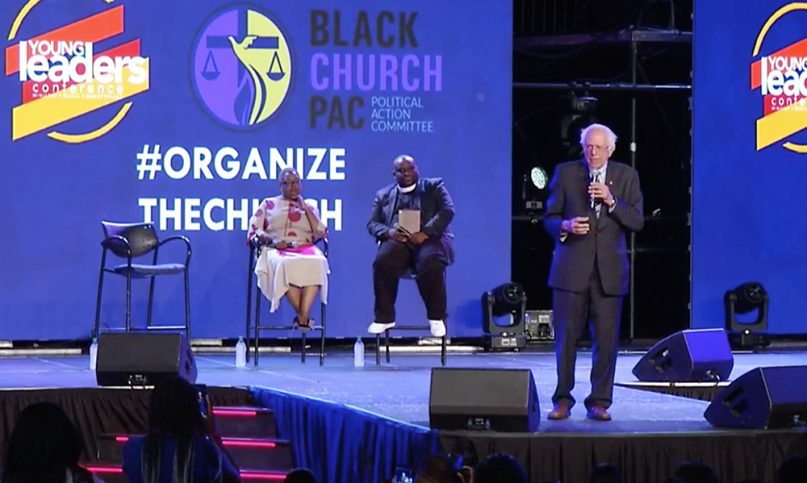
Sen. Bernie Sanders speaks at the Black Church PAC forum during the Young Leaders Conference on Aug. 17, 2019, in Atlanta. Video screengrab
The forum not only gave candidates an opportunity to make their case for why black voters should entrust them with their vote; it tested the candidates’ ability to connect with young black churchgoers who lean in a socially conservative direction — a voting bloc that is not necessarily well acquainted with long-established Democratic politicians and that has not necessarily bought in to the traditional progressive talking points.
Candidates got a chance to address the full conference but also met with small groups of voters and engaged in spirited dialogue about critical issues ranging from gun violence and the criminal justice system to student loan debt, immigration, education, health care and reparations. These sessions tested candidates’ expertise on critical issues but also revealed how comfortable they were listening to and being challenged by those with experiences very different from their own.
During the meeting, we ran a survey of close to 800 conference attendees to gauge their opinions about the candidates and issues, in addition to gathering qualitative responses. We plan to have a briefing with candidates to share these results before we make them public, but some quick takeaways include:
- Candidates who attended experienced a significant bump in their support; candidates who didn’t experienced a significant drop in their support.
- Close to 10% of respondents are unfamiliar with the candidates who were listed.
- The most important issues among those to take the survey: jobs/economy, gun violence, white nationalism.
A critical finding here is that most candidates have simply not broken through to young African American voters. This is alarming because, if this vital demographic is not actively engaged in selecting the eventual nominee, Democrats may end up with a nominee who fails to engage a significant voting bloc in the general election.
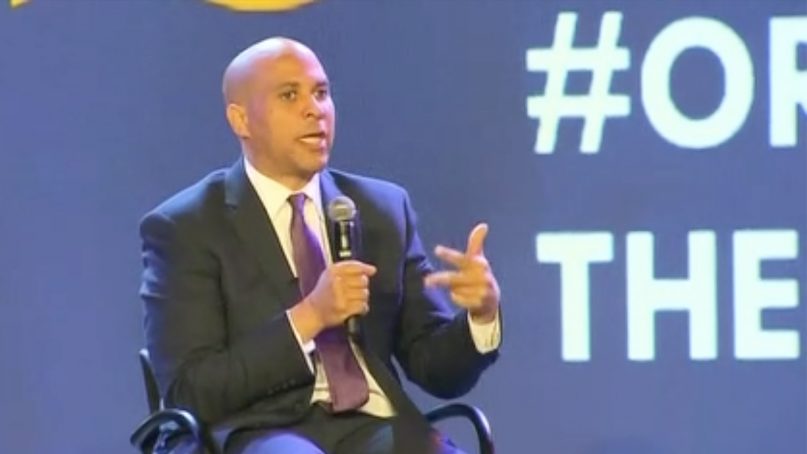
Sen. Cory Booker addresses the first day of the Black Church PAC presidential candidate forum at the Young Leaders Conference in Atlanta on Aug. 16, 2019. Video screengrab
Compounding this problem is the fact that Democrats have a miserable record of investing in black grassroots organizers, black community-based organizations and black political consultants, who are often best equipped to mobilize black voters.
Steve Phillips, the civil rights lawyer and founder of the website Democracy in Color, has described at great length the billion-dollar blunders Democratic and Allied Progressive groups continue to make in their political spending. The lessons to take from these unforced errors, he has said, are clear: Political spending in the Democratic ecosystem must be early, often and targeted to groups who register; and we must educate and mobilize black and brown voters, especially for turnout on Election Day.
When these types of investments are made, the results are dramatic. It was the targeted mobilization of black churches and historically black college students by black organizers and black political strategists that provided the margin of victory in the historic election of Democratic Sen. Doug Jones in Alabama in 2017.
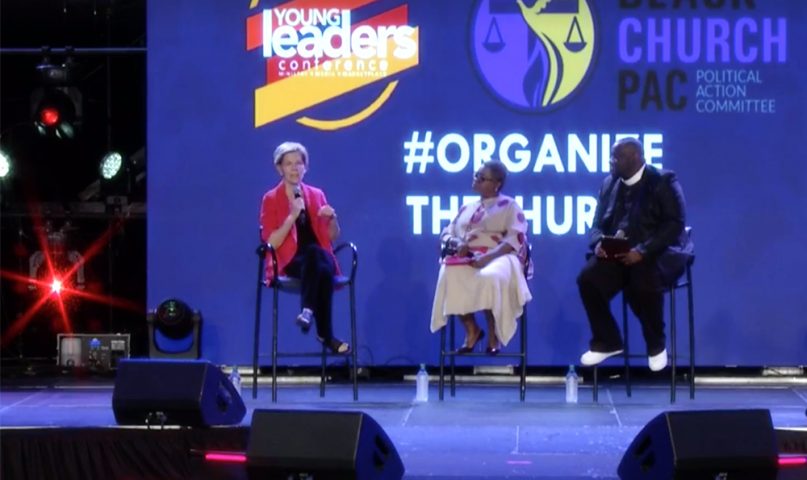
Sen. Elizabeth Warren, left, takes questions from moderators the Rev. Leah Daughtry and the Rev. Michael McBride during the Black Church PAC forum at the Young Leaders Conference on Aug. 17, 2019, in Atlanta. Video screengrab
The same kind of results could be achieved in swing states throughout the country if, rather than centering their campaigns around convincing white “Reagan Democrats” to stay blue, candidates doubled down on turning out reliably blue African American voters in places like Milwaukee, Detroit and Philadelphia.
We suspect that when candidates and their teams forgo this approach, it is because they do not have either the cultural proficiency or the willingness to make the black grassroots investments required to pull off this type of strategy. No one expects large numbers of blacks to vote for President Trump; however, operating as if African American and other voters will come out in droves simply to vote against Trump — without giving them someone who is compelling to vote for — is a risky and reckless approach.
Even within the more conservative bloc of the black church, Trump’s message is repulsive to millennials and their black elders. Unlike white evangelicals, whose support for Trump still hovers above 80%, socially conservative-leaning black church members detected very clearly the racialized rhetoric and dangerous policies of Trump and overwhelmingly do not support him. With meaningful engagement, these voters can be activated to vote for a candidate who promotes a compelling vision of belonging, justice and opportunity for all.
Through this election cycle and beyond, we will continue to give candidates opportunities to make their case and truly listen to black voters.
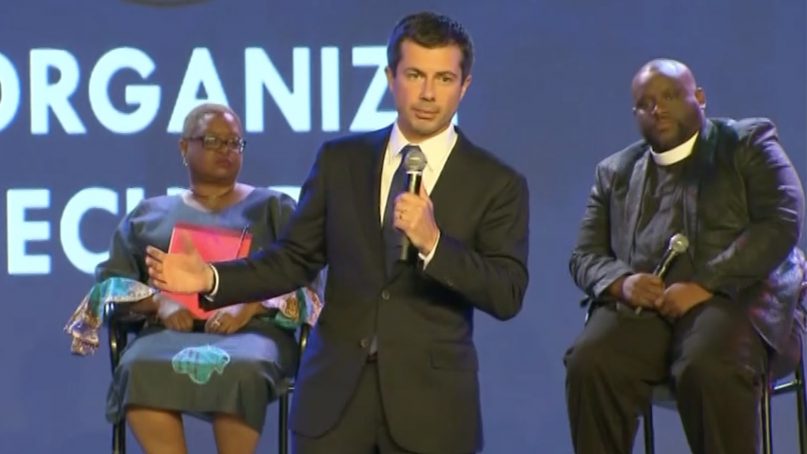
Presidential candidate Mayor Pete Buttigieg addresses the first day of the Black Church PAC presidential candidate forum at the Young Leaders Conference in Atlanta on Aug. 16, 2019. Video screengrab
(The Rev. Michael McBride is pastor of The Way Church in Berkeley, California, and national director of Faith in Action’s urban strategies and LIVE FREE Project. The Rev. Leah Daughtry, former CEO of the Democratic National Convention Committee, is presiding prelate-elect of The House of the Lord Churches and a founding board member of the Black Church PAC. The views expressed in this commentary do not necessarily reflect those of Religion News Service.)
